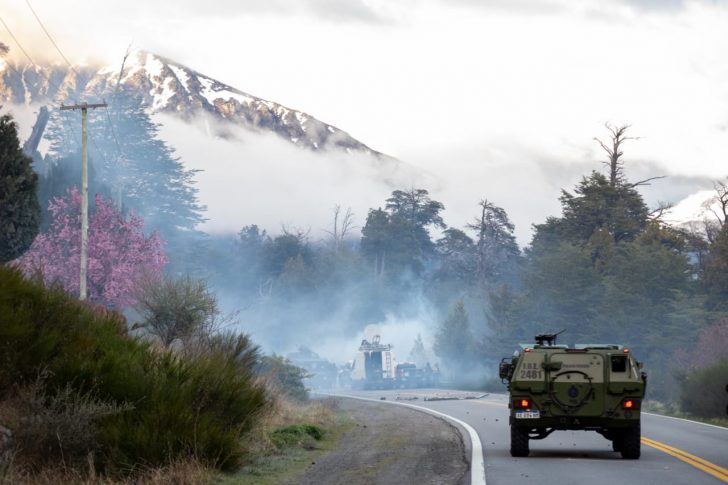Argentina’s Indigenous peoples are recognized as pre-existing the Argentine State and hold the right to ownership and possession of their ancestral lands. This recognition, however, is just empty rhetoric when it does not translate into policies that would guarantee the members of these communities the right to live their lives in peace and in keeping with their traditions. On the contrary, state response is often couched in rhetoric and stigmatizing stereotypes that identify them as enemies, foreigners or terrorists. This type of discourse from public officials, political or business sectors linked to real estate development, tourism or the extractive industry, usually leads to repression and criminalization of these groups.
The Constitution recognizes the pre-existing ethnicity and culture of Argentina’s Indigenous peoples and their right to community possession and ownership “of the lands they have traditionally occupied.” Respect for their cultural identity is necessarily tied to their territorial claims, because the ties formed by indigenous communities with their territory are essential to their identity, their very existence. Our policy framework also includes the international standards and obligations in this matter. Among others, ILO Covenant 169 obliges the State to identify the lands traditionally occupied by Indigenous peoples and to guarantee that they can inhabit them. It also says that it must safeguard the right of Indigenous peoples to use the lands to which they have had access for their traditional activities and subsistence purposes, even if they do not inhabit them at present. The Argentine State ratified this convention, i.e., it assumed the obligations thereunder.
There are other laws that should be applied. In 1985, Law 23.302 was enacted, establishing, among other issues, that the State would transfer fiscal lands to Indigenous communities and grant property titles. But instead of being a policy of national scope, these actions were only carried out as an exception. During the ‘90s and 2000s, the encroachment of intensive agricultural exploitation and the rise of big mining led to a process of constant eviction of indigenous communities from their territories. It was in this context in 2006 that Law 26.160 was passed as an emergency measure on the possession and ownership of lands inhabited by Indigenous communities, as a stapgap defensive measure by the political system. The law suspended the evictions in process in provincial and federal courts and provided for a survey of lands inhabited by communities throughout the country. Sixteen years after its enactment, more than half of the countries Indigenous communities are still waiting for their lands to be surveyed.
According to information published by the National Institute of Indigenous Affairs, there are approximately 1,802 Indigenous communities in the country; 779 have had their territorial surveys conducted. The National Institute of Indigenous Affairs, the agency responsible for conducting the surveys, has not had formally designated political authority for the past two months. Moreover, for nearly 30 years now since the Argentine Constitution was amended, these communities have been waiting for a law on Indigenous community property that would allow them to have property titles that specify the particular ties they hold with their territory. In April 2020, the Inter-American Court of Human Rights ordered the Argentine State to pass the law, in addition to another one guaranteeing prior, free and informed consultation with Indigenous populations before making decisions that affect them. There is still no concrete progress in Congress on either of these laws.
Recent episodes show that, in the face of weak political will to channel complaints or seek solutions to enforce Indigenous peoples’ rights to their lands, a powerful political and media lobby is on the rise that aims to block compliance with these laws and any timid progress toward expanding the rights of Indigenous peoples. In the past year, the few decisions seeking to expand the limits on recognition of these rights and, above all, of Mapuche communities, were met with immediate, disproportionate rejection. In some cases, decisions that had been made were reversed and the government officials who promoted them were cast out.
Indigenous communities have a long history of struggle for their territories – territories of which they have historically been dispossessed. This stripping of their lands has not ceased, despite the progress made in the recognition of their rights. The decision by these communities to move forward through different channels and actions to recover their lands must be viewed within this context. Their claims are the consequence of an historical debt. The characterization of this process as “Indigenous unrest” reinforces a process of stigmatization and racism. In the case of the Mapuche people, some of their ancestral lands are located in areas of increasing value for the market, especially for tourism and the development of the extractive industries. In light of pressure from these economic sectors, the State is obligated to create the political spaces and institutional mechanisms to channel the unrest and construct a territorial management policy that would enforce these communities’ rights to their lands.

